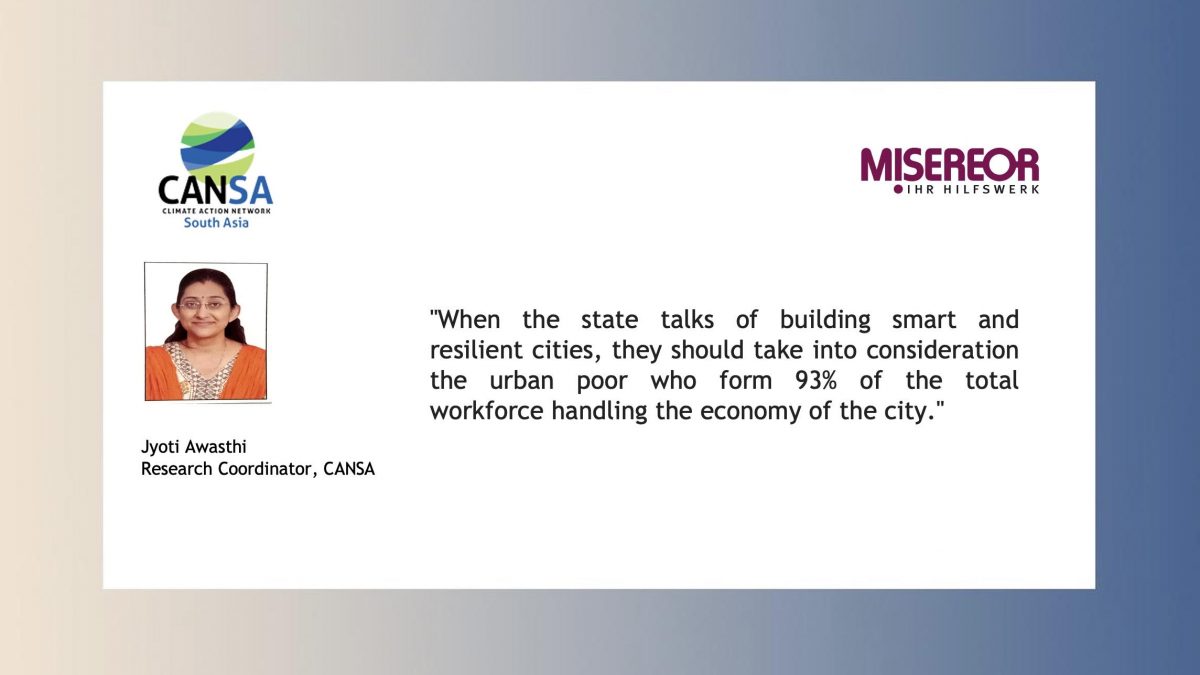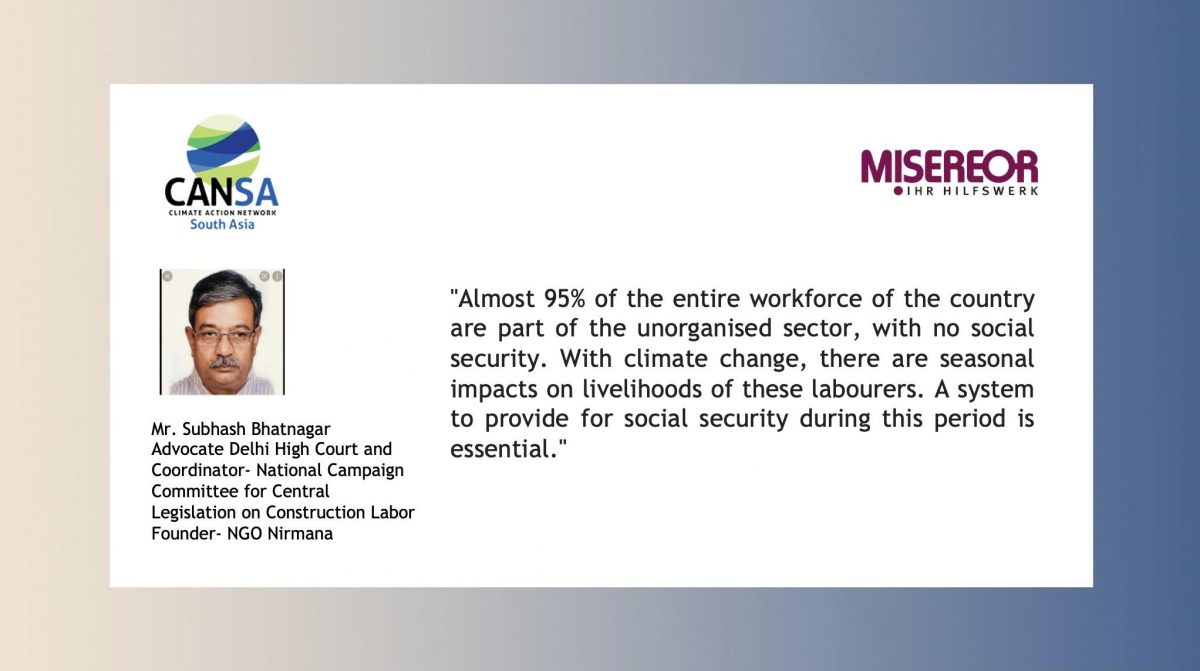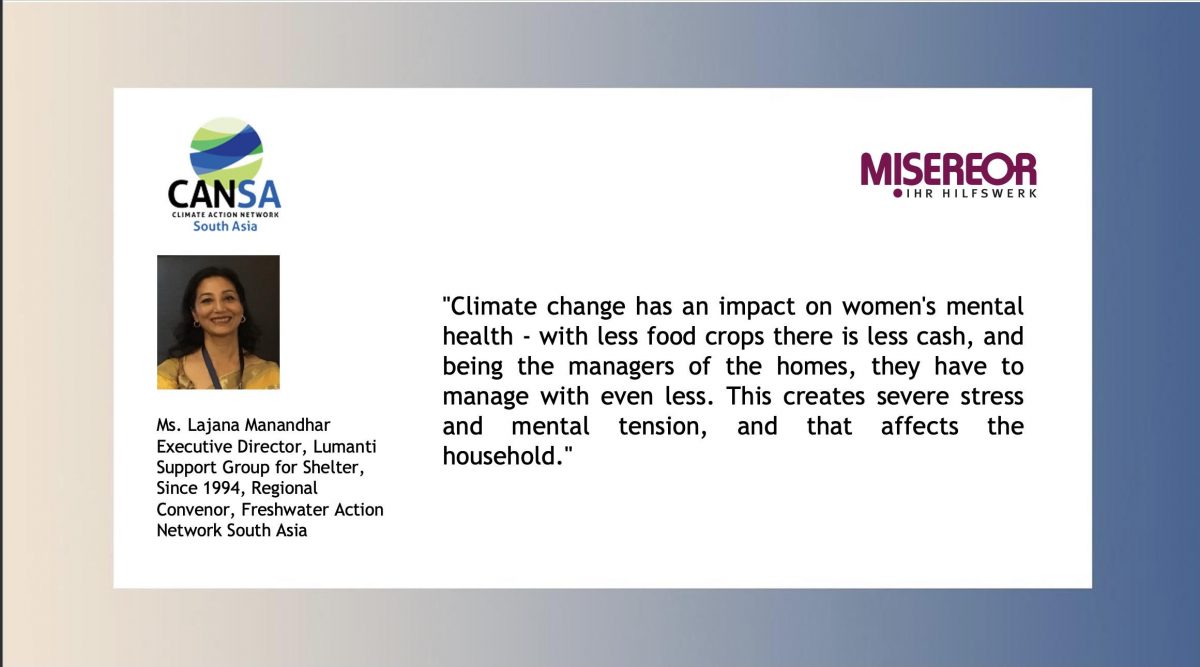Building climate-resilient cities through livelihood security for the urban poor

The webinar #ClimateResilientCities – Livelihood Security for self-employed unorganized sector workers, organised by CANSA on 16th September,is the third of four webinars touching upon various aspects of the impact of climate change on livelihood security and the various measures to be taken by the state to tackle the impact of income and job loss due to extreme weather events, especially for the poorest of the poor who depend on daily wages to ensure that their family and children are fed.
Among the speakers were those who have worked with #UrbanPoor communities and seen the impacts of climate change on them. They were Sanjay Vashist, Director, CANSA, Jyoti Awasthi, Research Coordinator, CANSA, Dr Md. Golam Rabbani, Head at Climate Bridge Fund Secretariat (BRAC), Subhash Bhatnagar, Advocate Delhi High Court & Coordinator – National Campaign Committee for Central Legislation on Construction Labour and Founder – NGO Nirmana, Chetna Saran, NGO Janpahal, working for street vendors and hawkers in Delhi, and Lajana Manandhar, Executive Director, Lumanti Support Group for Shelter.
Jyoti Awasthi began by making an important observation that “we do not look after the welfare and work rights of those very people who are subsidising our lives in urban centres. Under the umbrella of livelihoods, the role of construction workers, street vendors and hawkers, in our daily lives was clearly highlighted during the lockdown in the pandemic times. Till today we continue to face a lot of crises, as things have not been normalised in some countries and cities. So when we talk of urban and climate we need to see a close connection of how people’s lives are getting affected with the climate events that are happening at a more frequent pace and with more severity where the seasons are not falling in their right time.” In an urban climate event, the life and livelihood of street vendors goes for a toss; construction workers are not able to come to their work centres, domestic workers find it very difficult to commute to their daily workplaces and therefore many a times they lose their jobs. She emphasised how important these issues are, and must be considered in the city designs, for building resilient systems.
Dr Md. Golam Rabbani started by mentioning how in most urban centres, particularly in the coastal zones and critically affected, have an adverse impact on the livelihood of the poor communities. He talked about the three pillars of #Adaptation measures – 1. Improve the resilience in exposure to climatic hazards so affected people can take necessary actions to protect livelihoods; 2. Give an opportunity to improve the income of the urban poor; 3. Improve their social development so that they have access to social services. This will improve their overall resilient capacity to climatic events – the most recent severe one was Cyclone Yaas on 28 May 2021. Climate change impacts urban livelihoods which leads to loss of jobs, loss of income, loss of productivity, loss of livelihoods. Dr Rabbani also spoke about how CBF is working to strengthen livelihood resilience in urban areas by skills development training on food processing, embroidery, packaging, pricing and marketing. They also provide diversified livelihood options like mobile nursery, gardening, improving skills through online or classroom-based skills and digital literacy; training on productivity and economic gain through productivity improvement of women owned micro and small enterprises; technological inclusion, entrepreneurship development and financial literacy training of target women, men and youth.
Lajana Manandhar talked about Lumanti Support Group for Shelter which works towards providing safe, secure and sustainable communities where people have their rights respected and leads to a dignified life. She elaborated about the group’s studies to understand climate change in the local context with the women farmers in Kathmandu Valley and in Kalaiya and Sundar Haraicha municipalities. The findings of the studies were irregular rain pattern, flood and drought; drying of water resources, increased crop pests and diseases, decreased agricultural production, increased foggy events, attacks by animal in the buffer zones and increased events of lightning and hailstorms. The vulnerability issues affecting livelihoods are impact on women’s mental health along with shifting and strengthening livelihood, access to basic facilities infrastructure housing and partnership and building resource base. She talked about Urban Community Support Fund Model which is an autonomous body created within the municipality and the fund is chaired by the Mayor where finance is managed by the local woman cooperative. Lastly she highlighted some learnings and recommendations which are: to recognise and promote increase investments for women led community-based financing, resilient and empowerment practises; decision-making process needs to be inclusive with designated spaces for women, integrated approach is important to address climate change impact on livelihood issues and to promote climate and eco-friendly actions at all the levels.
Subhash Bhatnagar, who has fought for the rights of construction labourers, said that in India the working-class is divided into two segments – the organised sector and the unorganised sector. The organised sector is a section where there is long-term employee-employer relationship with the permanent team of management like the Government of India, other local governments, the construction companies, etc. The unorganised sector is where there is short-term ever-changing working relationship between employer and employee and there is no permanent team of management. He made an important point – in India the working conditions are so different in the organised sector and the unorganised sector that the law which is designed for the organised sector cannot be implemented in unorganised sector. We need to create a substitute to the absence of the management in the unorganised sector. As far as the long-term impact is considered for the livelihood of extreme weather conditions in case of construction workers and unorganised sectors we say it is a seasonal impact that repeats itself and it affects the working conditions as well as it affects productivity. So when during heavy rains, construction work has to slow down. In the same way, other occupations such as agriculture, fisheries cannot be executed during heavy rain – this is a seasonal impact which should also be included as part of the climate impact on the unorganised sector workers.
Chetna Saran mentioned the Street Vending Act that was passed in 2014 by the Central Government, based on which policies and rules were made by the Delhi government in 2017. The licence essentially mentioned that street vendors could operate only between sunrise and sunset; that would just not be very street vendor-friendly as they will be exposed to extreme heat, and sales would be dramatically lower during this time as no consumer would venture out in the heat of the day.
The lack of communication between street vendors and policymakers is a huge problem; when any policy is being drafted the NGOs need to be consulted, street vendors need to be consulted and policies need to be more street vendor-friendly. Government and policymakers must understand that in promoting street vending we are promoting a #ClimateResilientModel. If policies are street vendor-friendly, then they are climate-friendly policies. Better policies needs to be implemented for their work and home environment and there is need for more research-based studies, for example, we know more about the linkages between climate change and agriculture, similarly we need to understand the link between climate change and street vending.
Click here for Webinar recording, Passcode: te98+iSU
By Divyanshi Yadav, Communications Assistant, CANSA





#Adaptation #ClimateAdaptation #ClimateResilientCities #ClimateResilientModel #UrbanPoor




